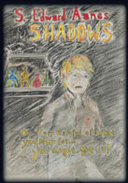"I feel affection from you! I feel it! But it cannot be real! It just can't because it's impossible! Remy - you are just a chunk of fucking plastic!"

 |
Shadows by S. Edward Aanes Trafford Publishing
book review by Wendy Strain
Written from a teenager's perspective during the late 1960s, Shadows is a story directed more toward an adult mind. The story begins with a bit of confusing time jumps, demonstrating an important element to the story—the passing of a great number of years and the slow changes that were taking place in that part of the world as time progressed. It also plays a key role in establishing the nature of the being that young Billy Beaudet will come to know as Remy. Without this early characterization, it would be very easy for the reader to slip into Billy's delusion.
Billy enters the story in the second chapter as he interacts with his best friend, Franco, and struggles to cope with parents who are neither abusive nor particularly attentive. Remy perhaps puts it best when he tells Billy they are both suffering from their own internal pain too much to consider what they might be doing to their son. As Billy desperately seeks someone to love him and guide him, one of his childhood mementoes suddenly comes to life to fill the void.
While Billy begins to thrive well beyond the limitations of his illiterate friend Franco, a number of other individuals around his town begin to suffer devastating losses. Detective Rick Wayman instinctively feels the crimes are somehow tied to Billy, but he cannot find the thread that connects them or the evidence that would warrant further investigation. Meanwhile, the being that has taken possession of Billy's plastic figurine, Remy, moves forward with his plan, slowly cultivating Billy along a path of destruction for more than just the boy.
The story is well written and carefully plotted, but contains nuances of meaning that might be easily missed by a less careful reader. It is all too easy to fall into Remy's trap, which is part of what the author seems to be trying to convey. The use of dialect with one of the characters creates some difficulty while use of language in general does not always seem consistent with the time period. Overall, it offers a great deal of food for thought.